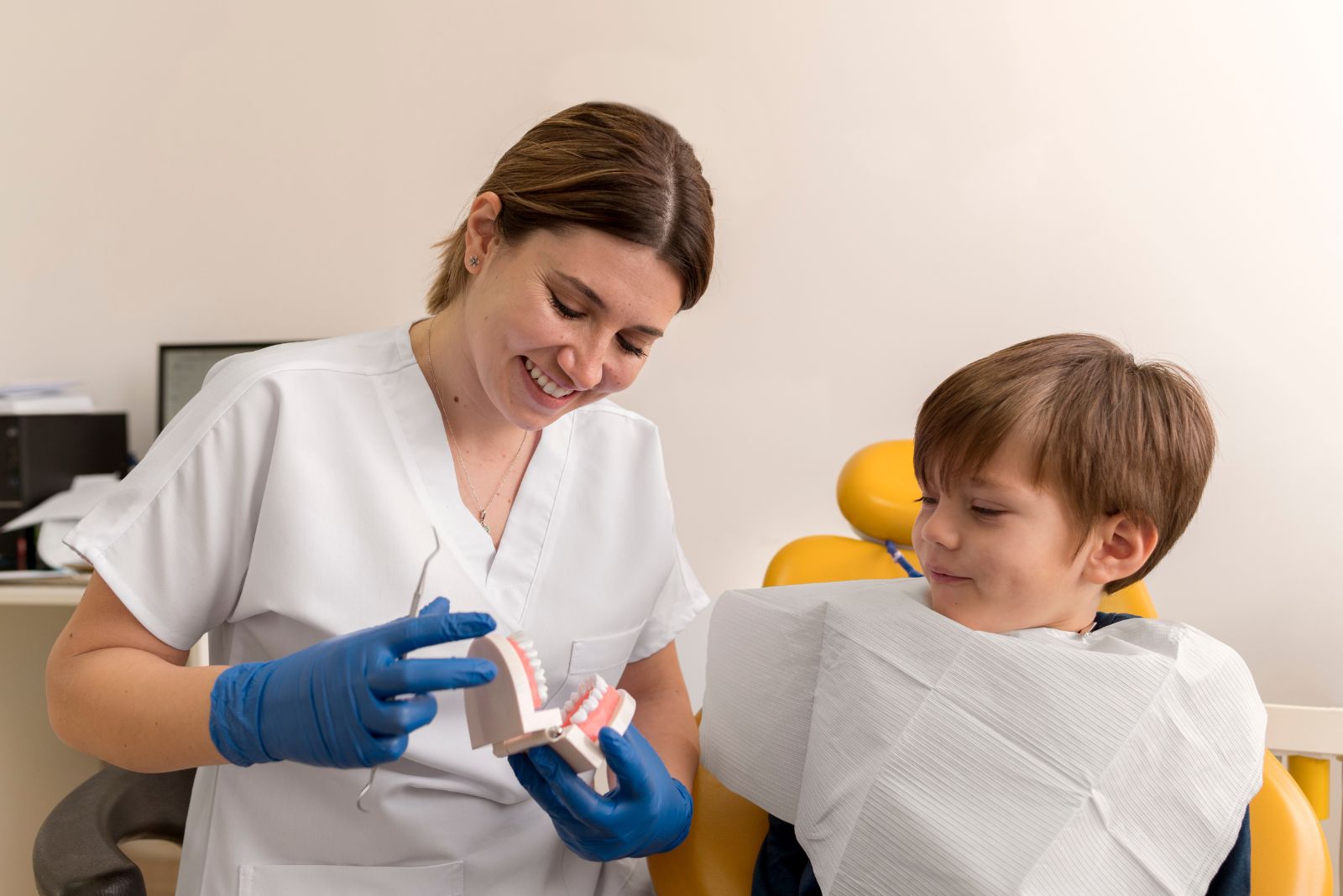Straight teeth do more than enhance appearance—they play a vital role in chewing, speaking clearly, and maintaining good oral health.
Many parents in Methuen wonder when the ideal time is for their child to visit an orthodontist.
Starting orthodontic treatment at the right age can make the entire process easier, faster, and more effective. Acting early can even prevent more serious dental issues in the future.
But how do you know when to begin? Should your child see an orthodontist at age 7, or wait until their teen years?
This guide will explore why timing matters, what signs to watch for, and what to expect as your child’s smile develops in the Methuen area.
Why Timing Matters in Orthodontics
Orthodontic treatment is most effective when a child’s jaw and teeth are still growing. In childhood, the bones are softer and easier to guide into the correct position.
This makes fixing problems simpler and can often avoid more complicated treatment later.
Waiting too long to start treatment can cause some dental problems, like crowded teeth or misaligned bites, to worsen over time.
Early intervention in Methuen can lead to better outcomes, often making treatment quicker and less invasive.
What Orthodontists Look For
Orthodontists examine how a child’s teeth fit together, known as the bite. They check for issues like overbites, underbites, crowding, or crooked teeth.
Some problems are obvious, while others need X-rays or special assessments to diagnose properly.
Even if your child still has baby teeth, an orthodontist can evaluate how the permanent teeth are coming in.
This evaluation helps determine if treatment should begin now or be postponed until more adult teeth emerge.
What Is the Ideal Age for a First Orthodontic Visit?
Experts recommend children in Methuen have their first orthodontic checkup around age 7.
At this stage, kids usually have a mix of baby and adult teeth, allowing orthodontists to spot early warning signs.
Not every child will need braces or other treatment immediately after this visit.
However, the initial exam helps set the path for future care and gives parents peace of mind by understanding what to expect.
Early vs. Later Treatment
Orthodontic treatment often happens in two phases. The first phase, usually between ages 6 and 10, focuses on guiding jaw growth and creating space for adult teeth.
The second phase typically occurs during the teen years and involves aligning the teeth with braces or clear aligners.
Some children only require treatment during their teenage years when all adult teeth have come in, usually between ages 11 and 14.
Others benefit from early intervention to correct growth issues and avoid more extensive work later.
Signs Your Child Might Need Early Treatment
As a parent in Methuen, watch for these signs indicating your child may need to see an orthodontist:
- Losing baby teeth earlier or later than normal
- Difficulty biting or chewing food
- Breathing through the mouth instead of the nose
- Thumb sucking beyond age 5
- Teeth that are crowded, misaligned, or blocked
- Jaws that click, shift, or look uneven
- Biting the inside of the cheek frequently
- A jaw that appears too far forward or backward
If you notice any of these signs, speak to your family dentist in Methuen for a referral to an orthodontic specialist.
How Braces Work for Kids
Braces apply gentle pressure over time to guide teeth into the right position.
They are effective in correcting crooked teeth, overbites, gaps, and other alignment issues.
While traditional braces use metal brackets and wires, many children in Methuen now have options for clear or tooth-coloured braces for a less noticeable look.
Typically, braces treatment lasts between 18 and 24 months, depending on the complexity of the case.
During treatment, your child will visit the orthodontist every few weeks for adjustments.
Sometimes, orthodontists use other appliances such as expanders or retainers before or after braces to help shape the jaw or maintain teeth alignment.
Are Braces Comfortable?
Braces may feel strange at first. Your child might experience some soreness for a few days after getting braces or after each adjustment.
Soft foods and over-the-counter pain relievers can help ease discomfort. Most kids adapt within a couple of weeks.
Good oral hygiene is essential during treatment.
Children need to brush and floss carefully around braces daily and avoid sticky or hard foods that can damage the braces.
Benefits of Starting Orthodontic Care at the Right Time

Beginning orthodontic treatment at the right age offers many benefits for Methuen families.
Early care may reduce the need for complex treatments later, shorten treatment duration, and boost your child’s confidence.
Fewer Problems Later
Early treatment can fix minor issues before they develop into major ones.
For example, expanding a narrow jaw while your child is still growing is easier than doing it after growth slows.
Correcting bite problems early can also prevent jaw pain and uneven tooth wear.
Saving Time and Money
Although early orthodontic treatment might seem costly initially, it can save money in the long run.
Preventing serious problems early may avoid surgery or extended braces treatment later on.
Helping with Confidence
A healthy, well-aligned smile helps kids feel more confident socially and academically.
Children who like their smile are more likely to smile often, participate in class, and engage positively with peers.
Common Questions Parents in Methuen Ask
What if my child’s teeth look fine?
Even if your child’s teeth appear straight, problems can hide beneath the gums. X-rays reveal if teeth are coming in properly or if there’s inadequate space.
That’s why a checkup around age 7 is recommended regardless of appearance.
Can my child still get braces as a teen?
Absolutely. Many children begin braces between 11 and 14 years old.
At this age, most adult teeth have erupted, and the jaw is still growing. If early treatment isn’t necessary, this age is still ideal for orthodontic care.
Will insurance cover braces?
Dental insurance coverage varies. Some plans include orthodontic benefits for kids.
It’s best to check your policy or talk to your provider about coverage, deductibles, and payment options.
Choosing the Right Orthodontist in Methuen, MA
Choosing a skilled orthodontist who works well with children is essential. Ask your family dentist in Methuen for recommendations.
Look for an office with a friendly environment and staff who clearly explain the process.
Local orthodontic care offers convenience and personalised attention.
A trusted specialist near Methuen can help your child feel comfortable throughout treatment and ensure the best results.
Life After Braces
Once braces come off, your child will need to wear a retainer to keep teeth in place. Retainers are usually worn at night, with some kids requiring longer use than others.
Regular dental visits remain important after orthodontic treatment.
These visits help monitor oral health and keep your child’s smile beautiful for years to come.
Good habits like brushing twice daily, flossing, and wearing retainers as instructed will protect your child’s straight smile well into adulthood.
Conclusion
Orthodontic care does more than improve looks—it supports chewing, speaking, and oral health. The American Association of Orthodontists recommends an initial evaluation by age 7 to identify any concerns early.
Starting treatment at the right time can reduce problems later, shorten treatment duration, and boost your child’s confidence. Whether your child needs early care or braces in their teens, the right orthodontic care makes a lifelong difference.
If you’re in Methuen, MA, consider scheduling a consultation with a local orthodontist experienced in children’s care. Early guidance can set your child on the path to a healthier, happier smile.
Sources:
- https://aaoinfo.org/whats-trending/when-should-your-child-see-an-orthodontist/
- https://www.touniorthodontics.com/blog/what-is-the-best-age-to-begin-orthodontic-treatment
- https://www.colgate.com/en-us/oral-health/early-orthodontics/what-is-the-best-age-for-braces
- https://aaoinfo.org/blog/when-should-my-child-see-an-orthodontist-age-7/








